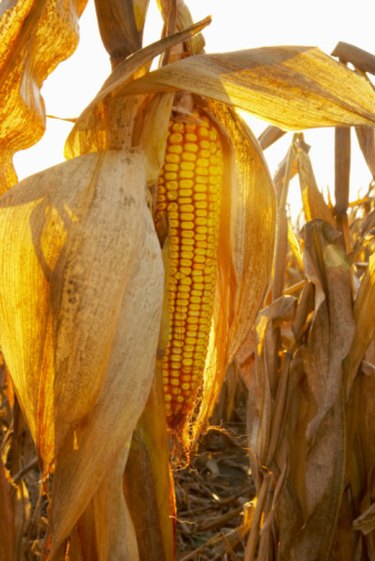
Growing sweet corn in a home garden is a hobby that many people enjoy during the summer months. Sweet corn can be infested with wireworms, European corn borers, flea beetles, fall armyworms, corn earworms, Japanese beetles and sap beetles. Choosing the best insecticide for your crop will help to decrease damage from these pests. Check with your agricultural extension service for insecticides that are approved for your area.
Sevin
Video of the Day
According to the University of Kentucky, Sevin, also known as carbaryl, is one of the insecticides recommended for control of pests on sweet corn. Monitor corn plants closely for any sign of damage and apply a Sevin insecticide suitable for sweet corn or place Sevin baits around plants immediately. Corn earworms can begin as soon as 10 percent of the ears are silked. The earworms then move in to lay their eggs on the green silks. Use Sevin every two to three days once silking has begun. Stopping the use of Sevin before harvesting the corn is recommended. Wash corn thoroughly to remove insecticide residue before eating.
Video of the Day
Permethrin
Permethrin is another pesticide recommended for use on sweet corn crops. According to Cornell University, permethrin, under the brand names of Ambush or Pounce, is one of the best insecticides for use against corn earworms, European corn borers and fall armyworms. Permethrin is highly toxic to bees, fish and beneficial insects. Use only as directed on the label and do not apply excessively to plants or soil. Corn treated with permethrin, which is a synthetic pyrethroid, should be washed carefully before consuming.
Bacillus Thuringiensis
Bacillus thuringiensis is a bacteria that affects insects. It is used as one of the best insecticides for use in managing pests in sweet corn. Unlike chemical pesticides, which act as a nerve poison, bacillus thruingiensis produces proteins that paralyze the digestive systems of plant insects causing them to die. According to Colorado State University, even the dead bacteria that contain these proteins are effective insecticides. It is nontoxic to people, pets and wildlife and will not kill beneficial insects that help to protect plants against pests. Its disadvantage is that bacillus thuringiensis does not kill rapidly and sunlight can degrade its effectiveness.
Natural Predators
Another effective way to control pests of corn crops is to introduce and sustain an environment for the natural predators of these pests. According to the National Sustainable Agriculture Service, lady beetles, lacewings, syrphid fly larva, big-eyed bugs, parasitic wasps and parasitic tachinid flies should be encouraged to live around corn crops to feed off the corn plant pests. Planting sweet alyssum, a flowering annual, near corn crops will help to attract parasitic wasps.